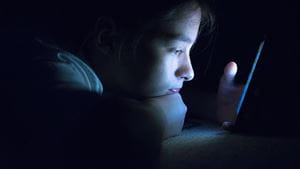
Most teenagers in the U.S. are on smartphones; an estimated 95 percent have access to one, according to a Pew Research survey. That same survey shows 45 percent of teenagers say they are “almost constantly” on the Internet.
It should come as no surprise, then, that reviews of sleep studies show a link between using screens, delayed bedtimes, and/or a drop in total sleep time.
To learn how the bodies and minds of teenagers are affected by a lack of sleep, we turned to Alice Hoagland, PhD, who serves as the Director of the Insomnia Clinic at the Rochester Regional Sleep Disorder Center and has more than two decades of experience studying the science of sleep.
To understand how teen phone use affects sleep, we first need to understand how teenagers sleep.
For most people, the amount of melatonin, a hormone that helps the body regulate its internal clock, begins to increase as they get ready to sleep at night. At the same time, one of the hormones linked to the body’s stress response – cortisol – starts to decrease as well.
Approximately 4 hours into the body’s natural sleep cycle, the melatonin levels start to drop off so the body can slowly begin to wake up after an 8-hour sleep cycle. At the same time, cortisol levels begin to increase as the body prepares itself for waking.
As a child becomes an adolescent and starts going through puberty, they experience a change in the time of day when those hormones are released – leading them into a delayed sleeping phase. As a result, they become night owls naturally. It is perfectly normal for teenagers not to start feeling sleepy until midnight. At the same time, they should be getting about 9 hours of sleep each night to function well.
Most parents who track their teen’s sleep schedule say their teens typically sleep 6-7 hours a night during the week. Since their bodies need closer to 9 hours a night, it makes more sense why they sleep so much more on weekends or by taking post-school naps.
“Cell phones will further delay an adolescent’s sleeping phase,” Dr. Hoagland said. “The moment someone gets on a cell phone, they are essential preventing their cortisol levels from naturally declining because they are becoming stimulated by the phone itself or the content on the phone.”
As many sleep experts have observed, cell phone use before the body goes to sleep has mostly negative effects for teenagers. There are three main issues linked to those negative effects.
Screens on electronic devices emit a specific type of light known as blue light. Studies show blue light alters the brain’s ability to process and use melatonin, which throws off the body’s internal clock.
Phones and tablets come with a Night Shift or Night Light mode, which filters out that blue light and lessens its effects on users. However, studies show even when teenagers are aware of the blue light blocking setting on their phones, only 4 percent actually use the setting.
Getting on the phone at night is shown to stimulate the arousal mechanism in the brain. When someone gets on their phone in bed and starts texting with friends or watching TikToks, this stimulates the part of the brain that controls wakefulness, heart rate, blood pressure, and reaction – effectively blocking a person’s body from shifting into sleep mode.
One recent study suggests teenagers who are on their phones around bedtime delay the onset of their sleep by at least 30 minutes. Another study compared adolescents who kept phones near their beds but didn’t look at them to adolescents who kept their phones in another room. Those who left their phones in their room still had poorer quality sleep compared to the others.
When researchers analyze the type of content kids are looking at online, it is often labeled as ‘addicting.’ Videos and apps are designed to keep users on them as long as possible; these technologies are created this way.
“Even though someone only wanted to be on the phone for 15 minutes to watch one short video, all of a sudden, it’s 45-60 minutes later and they are still “going down the rabbit hole” of watching videos,” Dr. Hoagland said.
By the time most kids are entering their teen years, they have a significant amount of cell phone use under their belts. With that knowledge, here are some things parents can do to help their teens claw back some of that sleep they need to function in a healthy way.
When parents first decide to allow their child to have their own cell phone, they need to talk with them about limits. The age at which a child starts using their own phone varies, but is happening at younger and younger ages.
For that reason, parents should have a frank talk about phone settings, times of day the phone can be used, social media use, and using the phone as an alarm clock.
Buying a simple alarm clock is useful since teens and adults alike use their phones as morning alarms. If a parent or teen wants to use their phone as an alarm, putting it on a charger across the room can be a good compromise.
“If someone keeps their phone directly next to them at night and happens to wake up at 2 am, it can be tempting to pick up the phone, see an unread message, and then suddenly they’re awake and on their phone for the next 30 minutes,” Dr. Hoagland said. “Keep the phone away from the bedside is a good way of avoiding that situation.”
Most of us know the saying ‘Do as I say, not as I do.’ With that in mind, parents need to model the behavior they want their kids to be living. This means keeping their phones out of the bedroom – or at least out of reach.
When the decision is made together, it makes it just a bit less frustrating for a teenager who might want to call out a double standard.
There is strength in numbers, too. If a group of parents comes together and agrees to a similar set of rules among all of their kids, that might be a helpful plan.
“Before prom, parents will often get together and set ground rules that they won’t allow underage drinking or other unhealthy activities in their homes,” Dr. Hoagland said. “Having that same mindset when it comes to teens and cell phone use before bed might be helpful for some families.”
